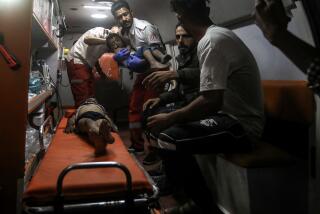Foreign Fighters Prefer Death Over Defeat
The two men stand uncomfortably side by side in the makeshift prison yard, unwarmed by the autumn sun. Both have longish hair, matted behind the ears, and bushy, untrimmed beards.
Until they wound up as prisoners, they were among the most feared fighters in the world--the foreign Taliban who came to Afghanistan from Muslim countries such as Pakistan and Saudi Arabia to wage holy war.
The foreign fighters are reputed to be die-hards who prefer death to defeat. The prisoners’ rhetoric matches that reputation.
“When I see people who aren’t Muslims, I want to make war against the infidels,” says Salihjan, 31, from Dubai, United Arab Emirates.
The foreign Taliban fighters have been the focus of intense concern as they made a last stand in the northern Afghan city of Kunduz. Besieged for more than 10 days and pummeled by American bombs, many resisted long past the point when other troops would have surrendered.
Why are they so eager to fight on?
Until they were captured about two weeks ago when their enemies overran Taloqan, the two men were among those prepared to keep on fighting. Now they shift their feet in the prison yard and offer some explanations for their commitment. Foremost is religious fervor, carefully cultivated by Taliban teachers.
“The Taliban told us that it is better to die in battle than surrender,” says the other POW, Maqsood Ali, a 22-year-old Pakistani. “You will be blessed in heaven if you die in battle.”
But as the men tell their stories, it becomes clear that there are additional factors that explain their actions. After five years in Afghanistan and apparent estrangement from his family, Salihjan has only Al Qaeda as his life.
Salihjan doesn’t want to talk about his family back in Dubai. His parents are Afghan, he says, but he was born and raised in the United Arab Emirates. He joined Al Qaeda in 1990 when he was 20 and arrived in Afghanistan in 1996 when the Taliban took power. His command of the local language, Dari, is so weak that he shifts back to Arabic.
His family’s entire income is $1,200 a month from Bin Laden, Salihjan says. It is a topic that seems to bring him shame, and he quickly refuses to give any details beyond saying: “I do not care about my family.
“We came here to teach people how to pray, how to read the Koran,” Salihjan says, fingering a string of tiny, dark red prayer beads. “I came here myself to see the people, to see if they are Muslim or not.”
Ali, who is not a member of Al Qaeda, says he arrived in Afghanistan just a month ago. He was attending a madrasa, or religious school, in the Pakistani city of Peshawar when his mullah urged him and his classmates to go fight against America, which had started bombing Afghanistan.
“Our leaders told us that the Northern Alliance aren’t real Muslims,” Ali says. “They told us that we have to make jihad against them.”
Ali spent a couple of weeks living in an abandoned school, studying the Koran and waiting for orders to go to the front. His Taliban teachers warned him against being captured.
“They said [the Northern Alliance] would kill us, beat us. Anything bad they could possibly do to us, they would do,” he says.
After the city of Mazar-i-Sharif fell to the Northern Alliance this month, reports emerged that hundreds of Taliban fighters had been killed in unclear circumstances after they were surrounded during a battle at a former girls school. Some of those killed are believed to have surrendered first, in which case killing them would be a war crime.
Last week, Northern Alliance leaders avoided discussing the fate of the foreign Taliban fighters, but they acknowledged that they didn’t want them to surrender. Alliance Gen. Mohammed Daud, in charge of Kunduz’s eastern front, said any foreigners who surrendered would face trial in Islamic courts. He declined to say what punishment the courts were likely to mete out.
Such talk may be part of the reason the foreigners have been negotiating with a different Northern Alliance commander, Gen. Abdul Rashid Dostum, who reportedly has promised them safe passage out of Kunduz. Although 600 foreign Taliban fighters reportedly turned themselves in over the weekend, the terms of their apparent surrender are unclear.
The foreigners’ fear of Northern Alliance justice is probably exacerbated by their sense of isolation from local Afghans, defectors said. Many do not speak any of the local languages, and they have kept to themselves in garrisons separate from local Taliban troops.
“They spoke Urdu, Chechen, Arabic, all sorts of languages we don’t understand,” said Umar Usman, 20, a native of the Kunduz region who defected to the Northern Alliance on Saturday and a day later was cooking rice pilaf next door to Daud’s headquarters. “Each group had their own commanders--they had their commanders, and so did we. Where they went, we didn’t go, and vice versa.”
There is little trust between the two Taliban divisions, Usman said.
The foreigners “are afraid they will be killed,” he said. “There are a lot of different ethnic groups in the Northern Alliance, and when any [of the foreign Taliban] surrenders, they are afraid. Every commander acts differently and makes his own rules.”
The result is a recipe for bloodshed: Thousands of fighters who want to die, besieged by thousands of troops eager to kill them.
“This is the way they think,” offered Abdul Jamil Gulamnabi, a former Taliban fighter who defected Saturday. “They think that no matter what they do, they will be killed. They say, ‘If I fight, I’ll die, and if I kill myself, I’ll die.’ If they give up, they think they will be killed anyway. So they might as well die in battle.”
More to Read
Start your day right
Sign up for Essential California for news, features and recommendations from the L.A. Times and beyond in your inbox six days a week.
You may occasionally receive promotional content from the Los Angeles Times.






